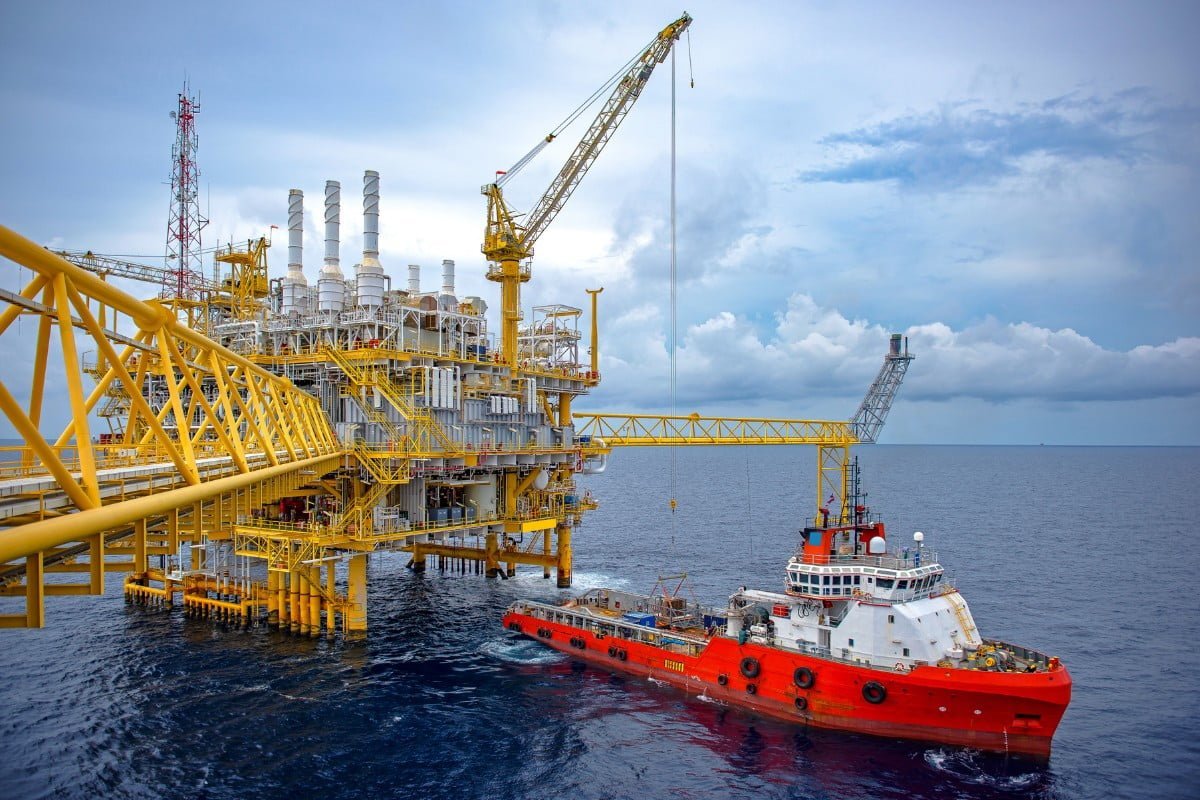Recently, for the first time in many years, workers on offshore oil and gas rigs have taken strike action. For 48 hours, from 10-12 May, North Sea workers employed across multiple contractors downed tools.
Over 1,500 workers, covering a wide range of occupations, from scaffolders to pipefitters, struck across the two days and nights, in a fight over pay, jobs, and conditions.
This follows an earlier 48-hour strike in April. This was so widespread that it resulted in a number of installations being shut down.
And further strike dates have also been announced for the coming weeks, with two more 48-hour strikes taking place on 1-3 June and 8-10 June.
John Boland, a Unite industrial officer, has called this “the biggest wave of industrial action in a generation in the offshore sector”.
1200 offshore contractors resume offshore strike action with another round of 48 hour strikes.
Oil & gas corporations continue to enjoy a profiteering bonanza. Unite’s members should get a much better share of the profits these oil giants are making.
They deserve it. pic.twitter.com/Ak1lWgch5o
— Unite Scotland (@UniteScotland) May 10, 2023
Profits
For many workers, the final straw in their decision to strike has been the bumper profits recorded by the fossil fuel giants who own these rigs, including companies like BP and Shell, as well as the money being made by their contractors.
While these oil barons and bosses are making billions, rig workers have not even received a real-terms increase in their pay. This has left many fuming, paving the way for these recent walkouts.
View this post on Instagram
There is often a perception that offshore workers are all handsomely rewarded, given the difficult nature of their work. But this is far from the case.
The energy monopolies, meanwhile, have made a killing over the last year. The conflict in Ukraine, and the subsequent sanctions against Russia, have led to skyrocketing prices for oil and gas, leading to tidy payouts for shareholders.
BP, to name just one, have reported underlying profits of £4.3 billion just for the first three months of this year.
Technically, these striking rig workers are employed by contractors. But they are all too aware of who really holds the purse strings in the industry.
Even then, many of these contractors themselves make profits to the tune of hundreds of millions.
Power
This is not the first time that anger in the oil and gas industry has spilled over into action.
Last May, hundreds of offshore rig workers took wildcat strike action, in what some dubbed a ‘wage revolution’.
This resulted in one contractor, Bilfinger UK, signing up to the Energy Services Agreement (ESA) – a collective bargaining agreement between the unions and the employers.
Wildcat action was then repeated just a few months later, last September. This led to the formation of an unofficial strike committee: the Offshore Oil and Gas Workers Strike Committee.

On behalf of the workers, this strike committee demanded a real, above-inflation pay rise, in order to make up for the downgrading of pay that has taken place over the years.
The workers’ committee also criticised the collapse of the previous Offshore Contractors’ Partnership Agreement in 2020, and its replacement with the ESA.
In a statement put out by the committee at the time, workers said that terms and conditions had been decimated, while the bosses “dressed up the new terms under the ESA as a game changer”. Workers, in short, were being presented with “total and utter rubbish”.
“We provide the energy to keep everyone’s lights on, yet seem to be the last to have our say,” the statement continued. “The time for action is now.”
These workers are clearly conscious of the power they hold. And they are prepared to use it.
Conditions
Socialist Appeal have received reports from offshore workers, including the facts about their pay and conditions.
For one, their shifts are gruelling. In the past, they were expected to work two weeks on, two weeks off. Now, the standard shift pattern is three weeks on, three weeks off.
As a result, many of these workers are unable to spend time with their loved ones, spending half their lives out in the middle of the sea.
Furthermore, rig accommodation is extremely cramped, consisting of tiny cabins. For comparison, the Bibby Stockholm – a barge commissioned by the Tory government to temporarily house asylum-seekers – was also once used to accommodate offshore workers.
And while offshore, even basic amenities are limited. On some rigs, for example, each worker is only allotted a limited amount of internet data. Once this runs out, these workers are then effectively disconnected from the rest of the world.
Blacklisting
As with many sectors, recent years have seen work become harder and more intense. Many of these contracted workers, for example, have been pushed to take on additional responsibilities – such as becoming industrial painters or welders – on top of their main role.
But this comes with very minimal training. Often there will be only a few days of training provided, with a basic qualification acquired. In the past, by contrast, employers offered well-paid apprenticeships, leading to highly-skilled workers in the industry, commanding higher wages.
In response, the bosses say that workers should consider themselves lucky to have ‘an extra string in their bow’. But workers are left wondering where their extra wages are, given that they are now doing two jobs for the price of one!
Disgracefully, there is also a legacy of blacklisting in this industry. This is known as being ‘NRBd’: Not Required Back.
Those trade unionists and militant workers deemed to be troublemakers by the bosses are sent back to shore, and are not able to return.
This practice was supposed to have ended. But many suspect that it is still very much being deployed by the employers, and remains a powerful threat hanging over the heads of workers.
‘Transition’
Given the uncertain future of the fossil fuel industry, many of these workers are worried about how the so-called ‘green transition’ may affect their livelihoods.
After all, under capitalism, when the bosses decide that there are greater profits to be made elsewhere, workers are left on the scrapheap. As a result, many workers want to ensure that there is proper support provided for retraining and reskilling.

Instead of employers forking out to provide this (a drop in their ocean of profits), outside ‘training’ companies, looking to make a quick buck, are stepping in.
These firms will offer workers courses to retrain in new skills. But these services often cost thousands of pounds – with the money coming out of workers’ own pockets!
We have heard one report about a worker who, when approaching their boss to ask if they could front the cost for such retraining, was simply laughed out of the room.
Clearly, these workers are not opposed to seeing the economy transition towards renewable energy sources. But they do want to ensure that their jobs and their futures are protected in this process, with the bosses bearing any costs.
Instead, parasitic middlemen are stepping in to profit from the ‘green transition’ – all with a nudge and a wink from the oil companies and contractors.
Struggle
Unite general secretary Sharon Graham has come out with bold language in support of these recent strikes, signalling that the union is prepared to wage a sustained struggle to win better pay and conditions for workers in this sector.
“Unite is prepared to fight over the long-haul,” Graham has stated, “because the union has to challenge unfettered corporate greed.”
What’s more, she has explicitly called out the shameless profiteering by the oil companies and contractors in this sector. This “corporate greed”, the union leader asserted, “has to be challenged, and it will be by Unite”.

Some have called for a windfall tax on these fossil fuel corporations. But this does not get to the root of the problem.
Ultimately, it is the workers themselves who are generating the mega-profits being taken home by these monopolies. And it is the working class who should have control over this immense wealth that they create.
Similarly, even just a handful of these workers have the ability to shut down these rigs completely. This shows where the true balance of power lies in society.
Furthermore, a one-off tax on the bosses’ profits does nothing to protect these workers’ livelihoods, or to address the poor conditions they face. As long as the energy sector remains in private hands, it is the bosses and the ‘invisible hand’ of the market that will decide workers’ fate.
Socialism
Instead, what is required is a full expropriation of these oil companies and their assets. These resources, in turn, should be directed towards a socialist green transition in the industry, including fully-funded, quality retraining and apprenticeships for all workers.

This should be accompanied by real-terms pay rises, linked to inflation, along with investment to improve the living and working conditions of these vital workers.
Importantly, these workers themselves know their workplaces better than anyone else. They should therefore be the ones in charge of running the industry, not management or bosses divorced from the day-to-day realities of life on the rigs.
These issues that plague the offshore sector are also prevalent in construction, transport, and many more. Unite – hand-in-hand with the wider trade union movement – must therefore fight for a sweeping socialist programme that can transform society and improve the lives of the whole working class for good.






